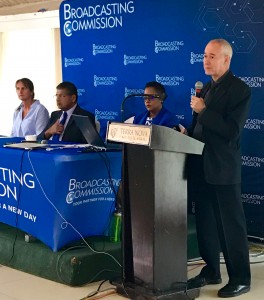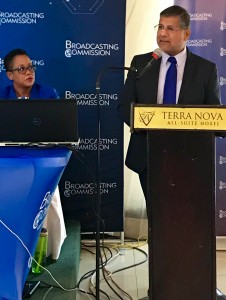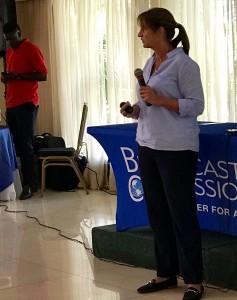
Get Safe Online – and Learn Some Life Skills
March 8th, 2020
The Broadcasting Commission is doing a grand job with public education. I do love their television ads, which are vibrant, well targeted and have a big dose of Jamaican energy and humor. Their “What If?” commercial (here’s the hip-hop version) is very well crafted, targeting youth with their warnings about the use or misuse of social media.
The Commission’s goal is not only to improve our digital literacy, but also to try to gauge the future of technology and communication. The landscape is transforming rapidly, as I write this piece.
The Commission partnered with a UK-based organization called Get Safe Online – yes, there’s a Jamaican website – for a series of six Online Protection Workshops in Kingston, Mandeville and Montego Bay. The sessions last week focused on youth as well as providing an absolute wealth of information on how we grown-ups (who think we know it all, and ought to know better) can protect ourselves while messing around online. And many of us do just mess around, rather aimlessly, I am afraid – without realizing the potential dangers.
“We would not dream of doing those things face to face, would we?” observed British High Commissioner to Jamaica Asif Ahmad. He was citing some examples of irresponsible online behaviour at the workshop at Kingston’s Terra Nova Hotel on March 2. Self control is critical, warned the High Commissioner.
The main presenter was Senior Manager and Family Protection Advisor at Get Safe Online, Liz Stanton. She took us through a detailed and eye-opening presentation on “Keeping Things Simple in the Digital World” and after the break – “Safeguarding Young People in the Digital World.”
Throughout the morning, many jaws dropped and many eyebrows were raised. Participants (including representatives of the teaching profession, students, as well as the National Parent Teacher Association of Jamaica, a voluntary organization) looked at each other in surprise, and made copious notes, although frankly it was hard to keep up with Ms. Stanton’s presentation at times. She had a lot of information to get through. However, there is a great deal of information and advice on the website (see the link above) and on the organization’s YouTube channel. There’s also a very detailed website here on “Protecting Yourself.” And it’s all free. As far as youth is concerned, you should also take a look at Eric Qualman’s YouTube video on Digital Transformation – a part of his Social Media Revolution project.
Dangers lurk for our young people, including online grooming. In a 2018 survey conducted by the University of Technology in Jamaica, “Life Online,” (I am trying to find the link to this), it was noted that paedophiles, predators and criminals are considered the main online risk factors for youth. 2,200 Jamaican students participated in the survey, from grades 7 to 13. This is the first generation to be considered “digital natives,” living as fully immersed in the digital world as in the real world.
For a young Jamaican, learning about keeping safe online is an important part of what we call “life skills.” Communicating properly is one of those skills. Adults have not all grown up with technology, but they can help with the life skills part. Just because our young people are adept at using smartphones and other devices (at an early age) does not mean they are equally knowledgeable about cybersecurity or have a sophisticated grasp of how to conduct relationships. They take unbelievable risks – although their unsuspecting parents might not know it. Children have literally thousands of “friends” on and offline.
Think carefully before you share photos of your children or young family members online; many parents share their photos with people they don’t know, for example on Facebook.
We learned so much that morning! For example, did you know (I sure didn’t):
- The age at which you can open accounts on Facebook, Twitter, Instagram, YouTube and LinkedIn is just thirteen years. For WhatsApp, it’s sixteen. To start a YouTube channel, you have to be seventeen years old.
- Using public WiFi hotspots can create all kinds of security problems.
- YouTube Kids can help you restrict or block words, among other safeguards (there is also an app).
- What3Words is an app related to your geolocation. Take a look at what3words.com.
- Two out of five young people never tell anyone about the worst thing that has happened to them online, for various reasons, according to a 2018 LGfL Digisafe Report.
- The term “child pornography” implies consent; use the more appropriate expression “child sexual abuse imagery.”

Professor Anthony Clayton’s presentation was somewhat chilling. At the table (l-r) are Liz Stanton of Get Safe Online, British High Commissioner Asif Ahmad, and Karlene Salmon, Deputy Executive Director of the Broadcasting Commission. (My photo)
One more thing: Chair of the Broadcasting Commission Professor Anthony Clayton declared himself “very concerned” about the presence of organized crime online. We are not just talking about a little fraud here and there; we are talking terrorism (including recruitment), child exploitation (which Professor Clayton described as “on an industrial level” in the Philippines) and more. The dark side of the Internet is very dark indeed; in New Zealand a year ago, Brenton Tarrant killed 51 people, injured 49, and live-streamed his deeds on Facebook. In the first 24 hours, YouTube had one upload per second on their platform. Facebook removed 1.5 million videos and blocked another 1.2 million at the point of upload. But the material was there six months later and perpetrators in Norway, Thailand, Ireland and the USA copied the killings. Narcotics trafficking, money laundering, counterfeit goods and more are all enabled by online tools, including social media. Globally, the cost of cybercrime has soared from US$445 billion in 2014 to $600 billion, three years later.
All this is scary stuff, isn’t it? Participants came out of the morning seminar better informed – and also a lot more sober and thoughtful. Let’s think critically when we are online; and let’s do a better job of guiding, informing and protecting our youth, as far as we are able.
Many thanks to the Broadcasting Commission (including its Executive Director Mr. Cordel Green) for this very enlightening series. In case you missed it, Professor Clayton and Mr. Green co-authored an excellent article earlier this year that referred to “a new generation of acute and subtle dilemmas” facing us citizens, and indeed nations, in the online world.
Acute and subtle, indeed. So, let’s be smarter.
Tags: Asif Ahmad, British High Commissioner, Broadcasting Commission of Jamaica, child abuse, child pornography, children, children's rights, Cordel Green, cybersecurity, education, Eric Qualman, Facebook, Get Safe Online, Internet, Jamaica, Kingston, Liz Stanton, Mandeville, Montego Bay, National Parent Teacher Association of Jamaica, Professor Anthony Clayton, social media, Technology, Twitter, University of Technology, UTech, WiFi, YouTube
The Gleaner reserves the right not to publish comments that may be deemed libelous, derogatory or indecent.
To respond to The Gleaner please use the feedback form.
- We Are the Zoomers
- Living Online with Humans and Birds: NAOC 2020
- Human Trafficking and the Problem of Public Education
- Down Memory Lane
- Are We Ready to Recover from COVID-19?
- Road Safety Matters: Is Your Vehicle Safe?
- Sexual Harassment, Me Too, and the Minister’s Disturbing Giggle
- The Vulnerable Senior Citizens, Private Care Homes and COVID-19
- A Muddle Over Masks
- Here is Something Life-Saving You Can Do: Give Blood!




